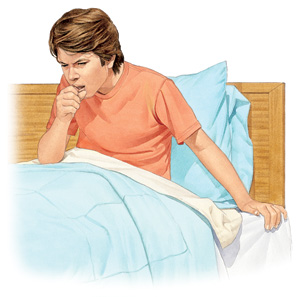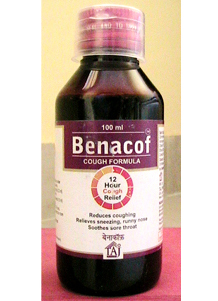|
|
COMPOSITION
Each 5 ml syrup contains Diphenhydramine Hydrochloride,
Celluloses, dicalcium phosphate, polysorbate, starch, stearic
acid, titanium dioxide, .
Uses
 runny nose
runny nose
 sneezing
sneezing
 itchy, watery eyes itchy, watery eyes
 itching of the nose or throat itching of the nose or throat
DESCRIPTION
Benacof ® is a preparation of Diphenhydramine Hydrochloride. It is
a well absorbed antihistamine and widely distributed throughout
the body, including the CNS. It is principally used as a potent
antihistaminic, antitussive, antiemetic, antiparkinsonian agent
.

INDICATIONS
Benacof ® (Diphenhydramine Hydrochloride) is indicated for the
treatment of following:
1) Seasonal, perennial & vasomotor rhinitis, 2) urticaria,
angioneurotic edema, anaphylaxis,
3) pruritus, 4) preanesthetic medication, emesis, motion sickness,
5) miscellaneous including meniere's diseases and parkinsonism, 6)
cough & cold. Sometimes it may use as a night time sleep aid and
for the short-term management of insomnia.

DOSAGE
Adults & Children over 12 years of age
Most allergic conditions are controlled with 25 to 50 mg i.e. 3 to
4 times a day.
Children 6 to 12 years of age: 10 mg i.e., (5 ml of syrup) 3 to 4
times a day.
Children 1 to 6 years of age: 5 mg i.e., (2.5 ml of syrup) 3 to 4
times a day.
In cough & cold
Adults: 25 mg every 4 hrs. Not to exceed 150 mg in 24 hours.
Children (6 to 12years): 12.5 mg every 4 hours. Not to exceed 75
mg in 24 hours.
Children (2 to 6 years): 6.25 mg every 4 hours. Not to exceed 25
mg in 24 hours.
CONTRAINDICATIONS
Diphenhydramine Hydrochloride is contraindicated for the premature
or newborn infants. Any patients in whom drowsiness is undesirable
e.g. drivers, machine operators. Concomitant consumption of
alcohol or central nervous system (CNS) depressants will
potentiate drowsiness. Patients with known hypersensitivity to
Diphenhydramine or any components of the product.
PRECAUTIONS
Patients should be cautioned not to operate vehicles or hazardous
machinery until their response to the drug has been determined.
DRUG INTERACTIONS
Diphenhydramine hydrochloride administration significantly reduces
the absorption of the antituberculous agent para-aminosalicylic
acid (PAS) from the gastrointestinal tract. It has also additive
effects with alcohol and other CNS depressants (hypnotics,
sedatives, tranquilizers, etc). MAO inhibitors prolong and
intensify the anticholinergic (drying) effects of
antihistamines.
OVER DOSAGE
Antihistamine over dosage reactions may vary from central nervous
system depression to stimulation. Stimulation is particularly
likely in children. Atropine like signs and symptoms such as
dryness of mouth, fixed and dilated pupils, flushing and
gastrointestinal symptoms may also occur.
SIDE EFFECTS
Side effects include drowsiness, dizziness, dryness of mouth,
blurred vision, nausea and vomiting.
USE IN PREGNANCY & LACTATION
There are no adequate and well-controlled studies in pregnant
women using diphenhydramine hydrochloride. Therefore,
diphenhydramine hydrochloride should be used in pregnancy only if
clearly needed. Diphenhydramine hydrochloride has been reported to
be excreted in breast milk and thus, use of diphenhydramine
hydrochloride in lactating mother is not recommended.
PRECAUTION
Store at a cool and dry place, away from light. Keep out of the
reach of children.
PACKING
Benacof ® Syrup: Each bottle contains 100 ml syrup and a
measuring cup.
|
|






